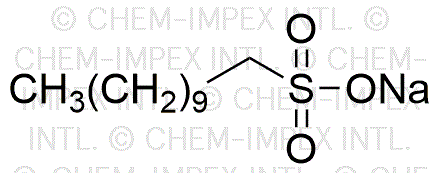Sodium 1-undecanesulfonate is widely utilized in research focused on:
- Surfactant Applications: This compound serves as an effective surfactant in various formulations, enhancing the solubility of hydrophobic substances in water. It is commonly used in detergents and cleaning products, providing better cleaning efficiency.
- Biochemical Research: In laboratories, it acts as a stabilizing agent for proteins and enzymes, helping maintain their activity during experiments. This is particularly beneficial in studies involving membrane proteins.
- Cosmetic Formulations: The compound is incorporated into personal care products, such as shampoos and lotions, due to its ability to improve texture and spreadability, making products more appealing to consumers.
- Environmental Applications: It is used in the treatment of wastewater, where it aids in the emulsification of oils and greases, promoting better separation and removal of contaminants.
- Food Industry: Sodium 1-undecanesulfonate can be utilized as a food additive, enhancing flavor and texture in various food products, while also serving as a preservative to extend shelf life.
General Information
Properties
Safety and Regulations
Applications
Sodium 1-undecanesulfonate is widely utilized in research focused on:
- Surfactant Applications: This compound serves as an effective surfactant in various formulations, enhancing the solubility of hydrophobic substances in water. It is commonly used in detergents and cleaning products, providing better cleaning efficiency.
- Biochemical Research: In laboratories, it acts as a stabilizing agent for proteins and enzymes, helping maintain their activity during experiments. This is particularly beneficial in studies involving membrane proteins.
- Cosmetic Formulations: The compound is incorporated into personal care products, such as shampoos and lotions, due to its ability to improve texture and spreadability, making products more appealing to consumers.
- Environmental Applications: It is used in the treatment of wastewater, where it aids in the emulsification of oils and greases, promoting better separation and removal of contaminants.
- Food Industry: Sodium 1-undecanesulfonate can be utilized as a food additive, enhancing flavor and texture in various food products, while also serving as a preservative to extend shelf life.
Documents
Safety Data Sheets (SDS)
The SDS provides comprehensive safety information on handling, storage, and disposal of the product.
Product Specification (PS)
The PS provides a comprehensive breakdown of the product’s properties, including chemical composition, physical state, purity, and storage requirements. It also details acceptable quality ranges and the product's intended applications.
Certificates of Analysis (COA)
Search for Certificates of Analysis (COA) by entering the products Lot Number. Lot and Batch Numbers can be found on a product’s label following the words ‘Lot’ or ‘Batch’.
*Catalog Number
*Lot Number
Certificates Of Origin (COO)
This COO confirms the country where the product was manufactured, and also details the materials and components used in it and whether it is derived from natural, synthetic, or other specific sources. This certificate may be required for customs, trade, and regulatory compliance.
*Catalog Number
*Lot Number
Safety Data Sheets (SDS)
The SDS provides comprehensive safety information on handling, storage, and disposal of the product.
DownloadProduct Specification (PS)
The PS provides a comprehensive breakdown of the product’s properties, including chemical composition, physical state, purity, and storage requirements. It also details acceptable quality ranges and the product's intended applications.
DownloadCertificates of Analysis (COA)
Search for Certificates of Analysis (COA) by entering the products Lot Number. Lot and Batch Numbers can be found on a product’s label following the words ‘Lot’ or ‘Batch’.
*Catalog Number
*Lot Number
Certificates Of Origin (COO)
This COO confirms the country where the product was manufactured, and also details the materials and components used in it and whether it is derived from natural, synthetic, or other specific sources. This certificate may be required for customs, trade, and regulatory compliance.

